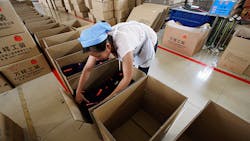China’s Trade Surplus Hits $49.8 Billion, But Worry over Import Decline
BEIJING -- As imports saw a surprising fall and export growth slowed in a further sign of softness in the world's second-largest economy, China's trade surplus surged to a record $49.8 billion in August, figures showed Monday.
The mixed bag of data from the General Administration of Customs follows a string of figures showing continued weakness in the economy, fanning expectations the government will unveil new measures to boost growth.
Imports declined 2.4% year-on-year to $158.6 billion, while exports increased 9.4% to $208.5 billion.
The surplus surged 77.8% year-on-year to beat the previous all-time high of $47.3 billion set in July and easily pass the median forecast of $42 billion.
The news will do little to ease worries about the economy after a recent batch of disappointing data as a series of mini-stimulus measures have failed to kickstart growth.
Last week two closely watched indexes indicated that expansion in manufacturing activity slowed in August. And in July, bank lending plunged while growth in key measurements such as industrial production, retail sales and fixed-asset investment lost momentum from the previous month.
Analysts say China's outlook is being damaged by trouble in its huge property sector -- where new home prices in August saw their fourth consecutive month-on-month decline -- and the waning effect of stimulus measures taken earlier this year. "We expect the government to continue to roll out small, targeted easing measures to offset the ongoing property market correction," Nomura economist Hua Changchun and colleagues said in a note reacting to the trade data.
Worries over Imports
The continuing import decline "is another worrying sign of weak domestic demand", they added.
In March the government set its 2014 growth target at about 7.5%, the same goal as last year. The economy grew 7.7% in 2013, matching 2012's result which was the worst since 1999.
The poor performance in the first three months prompted authorities in April to introduce measures to boost growth, such as tax breaks for small enterprises, targeted infrastructure spending and lending incentives in rural areas and for small companies.
However, ING economist Tim Condon said: "The weak imports reinforce fears that the impact of any mini-stimulus or targeted measures didn't last very long."
Despite the slowdown from July, the August export figure can still be considered a bright spot, said ANZ Bank economists Liu Li-Gang and Zhou Hao.
"China's export growth slowed... but still remained upbeat, reflecting continuously improving external demand," they wrote in a report, citing improving appetite in the United States.
"China's exports will likely remain elevated for the remainder of this year."
But the Nomura economists cautioned that the outlook in overseas markets is precarious owing to concerns about Europe. "External demand... faces a high level of uncertainty, with European growth weakening and geopolitical risks," they wrote.
- Kelly Olsen, AFP
Copyright Agence France-Presse, 2014
About the Author
Agence France-Presse
Copyright Agence France-Presse, 2002-2025. AFP text, photos, graphics and logos shall not be reproduced, published, broadcast, rewritten for broadcast or publication or redistributed directly or indirectly in any medium. AFP shall not be held liable for any delays, inaccuracies, errors or omissions in any AFP content, or for any actions taken in consequence.
